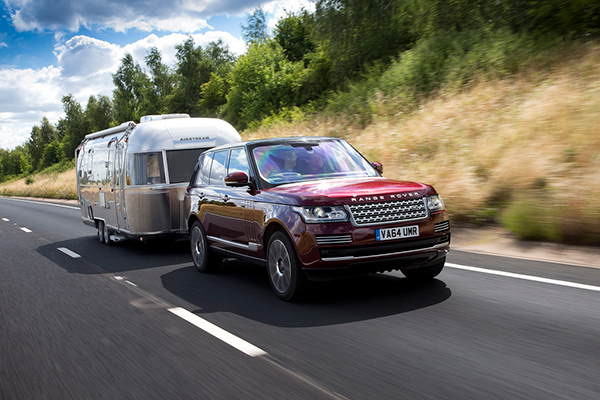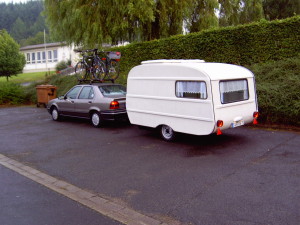Safety Tips for Towing Your RV Travel Trailer

Towing a trailer may not appear as complicated as it is. And even an experienced RVer can make a simple towing mistake that leads to a disaster. When you’re towing an RV, the enormous weight behind you can push you forward if you’re not careful. The trailer you’re towing could also begin to sway into oncoming traffic or neighboring lanes. Before even attempting to tow your trailer, you must make sure that your vehicle is rated to handle the load you’re towing. If not, you’ll have a hard if not impossible time handling, accelerating and stopping.
The following tips will help ensure that you get to your destination safely and without any mishaps.
Stopping with a Trailer
Trailers have electric brakes, which are very different from the hydraulic brakes in a standard car. To operate the brakes’ controllers you must drive differently than you’re used to. To make a full stop, it’s best to brake very lightly a couple of hundred feet away from where you’re trying to stop. As you gradually increase the tension on the brakes in your vehicle, you will also slow down the trailer’s wheels without locking them up. Keep in mind that braking too fast could result in dangerous skidding or worse.
Even if you stop abruptly, your trailer’s brakes will still take a while to come to a full stop. If you’re close to the car in front of you and you slam on the brakes, your RV probably won’t stop in time, and you may end up in a collision. Also, if you release your foot off the brakes, your trailer’s brakes release too. If you brake again after lifting your foot off, it will again take a few seconds for the trailer’s brakes to come to a full stop. You should avoid lifting off the brake pedal if a full stop is coming up very soon.
Preventing Swaying, Tail Wagging & Whipping
Tongue Weight
Loading your trailer properly is very important in ensuring the vehicle doesn’t get out of control, especially on the highway at fast speeds. To prevent the trailer from swaying or whipping, make sure that at least 10% of the weight of your loaded trailer is tongue weight. If the tongue weight is less than 10-15% of the full load’s weight, your trailer will begin swaying once you’re on the road. If the tongue weight is too heavy, steering will become difficult. For a 5th wheel, the tongue weight could be as high as 25%.
To adjust your tongue weight to 10-15%, you’ll need to know your gross trailer weight. This is the weight of the trailer plus the cargo you plan to bring with you. Let’s just say the trailer weighs 600 pounds and you have 200 pounds of cargo. You’ll want the tongue weight to be 10-15% of that, or 80-120 pounds. If you RV often, a tongue weight scale is a great investment.
Gross Trailer Weight
 You also need to pick the appropriate hitch. They are divided into classes based on gross trailer weight (GTW):
You also need to pick the appropriate hitch. They are divided into classes based on gross trailer weight (GTW):
- Class 1: 2000 pounds GTW/200 pounds tongue weight
- Class 2: 3500 pounds GTW/350 pounds tongue weight
- Class 3: 5000 pounds GTW/500 pounds tongue weight
- Class 4: 7500 pounds GTW/750 pounds tongue weight
- Class 5: 10,000 pounds GTW/1000 pounds tongue weight
A properly placed load in your trailer will ensure a proper tongue weight and a safe driving experience. The best way to know the precise gross weight of your trailer is to weigh it. You can do this at stone-and-gravel yards, feed stores and truck stops. Make sure to load everything you plan to take with you on your trip. Also, make sure water tanks and propane tanks are full before weighing.
Placing Your Load Weight Correctly
Next, move your cargo around until you get the right weight distribution. Use tie-downs to keep your things in place. Otherwise, a shift may change the weight distribution and cause instability. As a general rule, the heaviest cargo (and 60% of the total cargo weight) should be placed in front, just ahead of the trailer’s axle. It must also be centered and tied down. Everything else should be evenly distributed on all sides. Basically, you want the weight distributed on all four tires. If you are tail-heavy because you stored too much stuff in the far rear of your RV, you will most likely sway. Swaying can be terrifying and dangerous, especially on the highway. Avoid swaying whenever possible.
You’ll also want to load all top-heavy cargo first. This type of cargo should be tied at a few angles so they don’t fall over. If some does fall over, the weight distribution of your trailer will be completely thrown off. You may want to invest in an equalizer hitch, which redistributes the weight of the trailer over your towing vehicle.
RV Insurance
For whichever type of trailer you’re hauling, you’ll want to make sure you have the right amount of RV Insurance coverage. An accident could be costly to pay for out of pocket, so make sure you’re protected by the right policy. To ensure you have the best coverage for your RV, call an RV Insurance Specialist at (866) 501-7335.
The information in this article was obtained from various sources. This content is offered for educational purposes only and does not represent contractual agreements. Nor is it intended to replace manuals or instructions provided by the manufacturer or the advice of a qualified professional. The definitions, terms, and coverage in a given policy may be different than those suggested here. Such policy will be governed by the language contained therein. No warranty or appropriateness for a specific purpose is expressed or implied.
